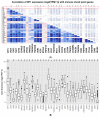Identification of SPP1 as a Prognostic Biomarker and Immune Cells Modulator in Urothelial Bladder Cancer: A Bioinformatics Analysis
- PMID: 38067407
- PMCID: PMC10705199
- DOI: 10.3390/cancers15235704
Identification of SPP1 as a Prognostic Biomarker and Immune Cells Modulator in Urothelial Bladder Cancer: A Bioinformatics Analysis
Abstract
Secreted phosphoprotein-1 (SPP1) expression is differentially altered in many malignancies and could serve as a potential prognostic biomarker. Recent findings indicated that SPP1 possesses a broader role in bladder cancer (BC) pathogenesis than previously envisioned; however, the underlying mechanisms governing its expression, cellular localization, prognostic value and immune-related role in bladder cancer remain poorly understood. The expression and the prognosis value of SPP1 were assessed using immunohistochemistry (IHC) staining on a tissue microarray. SPP1 expression was correlated with the clinicopathological parameters, and survival analysis was calculated using a Kaplan-Meier plotter. Bioinformatics analysis of TCGA data was queried using UALCAN, CIBERSORT and TIMER datasets to decipher the biological processes enrichment pattern, protein-protein interactions and characterize tumor-infiltrating immune cells, respectively. IHC revealed that SPP1 expression is significantly associated with tumor type, stage, grade and smoking status. The Kaplan-Meier survival curve showed that low SPP1 expression is an unfavorable prognostic indicator in bladder cancer patients (p = 0.02, log-rank). The significant increased expression of the SPP1 level is associated with evident hypomethylation of the gene promoter in cancer compared to normal tissues in the TCGA-bladder dataset. Missense mutation is the most frequent genetic alteration of the SPP1 gene. Protein-protein interactions demonstrated that SPP1 shares the same network with many important genes and is involved in many signaling pathways and biological processes. TIMER reported a significant correlation between SPP1 expression and multiple immune cells infiltration. Furthermore, the expression of SPP1 was found to be positively correlated with a number of immune checkpoint genes such as PD-1 and CTLA4. The current investigation indicates that the SPP1 protein could serve as a prognostic biomarker and merit further investigation to validate its clinical usefulness in patients with bladder cancer.
Keywords: SPP1; bioinformatics; biomarker; bladder cancer; immune infiltration; prognostic.
Conflict of interest statement
The authors declare no conflict of interest.
Figures








References
-
- Hussain S.A., Porta N., Hall E., Salawu A., Lewis R., Sreenivasan T., Wallace J., Crundwell M., Jenkins P., Tremlett J., et al. Outcomes in Patients with Muscle-invasive Bladder Cancer Treated with Neoadjuvant Chemotherapy Followed by (Chemo)radiotherapy in the BC2001 Trial. Eur. Urol. 2020;79:307–315. doi: 10.1016/j.eururo.2020.11.036. - DOI - PubMed
-
- Witjes J.A., Bruins H.M., Cathomas R., Compérat E.M., Cowan N.C., Gakis G., Hernández V., Espinós E.L., Lorch A., Neuzillet Y., et al. European Association of Urology Guidelines on Muscle-invasive and Metastatic Bladder Cancer: Summary of the 2020 Guidelines. Eur. Urol. 2021;79:82–104. doi: 10.1016/j.eururo.2020.03.055. - DOI - PubMed
Grants and funding
LinkOut - more resources
Full Text Sources
Research Materials
Miscellaneous

